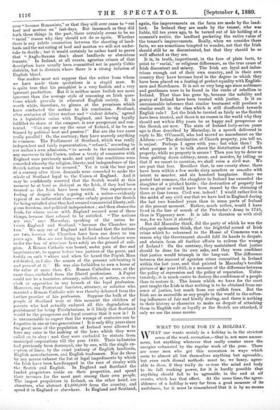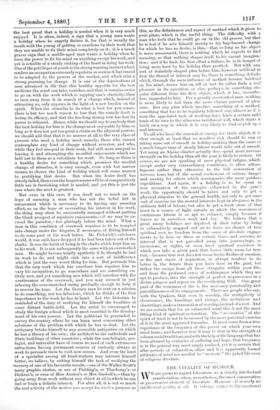WHAT TO LOOK FOR IN A HOLIDAY.
WHAT one wants mainly in a holiday is, in the strictest sense of the word, recreation,—that is, not mere amuse- ment, but anything whatever that really creates anew the energies exhausted by the regular work of the year. There are some men who get this recreation in ways which seem to almost all but themselves anything but agreeable; but even such dismal methods must be, we fancy, agree- able to them, if they really do restore the mind and body to its full working power, for it is hardly possible that anything should fail to be agreeable, in the end at all events, which has that effect. At the same time, the agree- ableness of a holiday is very far from a good measure of its usefulness, for it must be remembered that it is by no means
the best proof that a holiday is needed when it is very much enjoye3. It is often, indeed, a sign that a young man wants a holiday when he eagerly desires it, for that is usually the result with the young of getting so overdone by their work that they are unable to fix their mind completely on it ; it is a much graver sign that a middle-aged man wants a holiday when he loses the power to fix his mind on anything except his work, and yet is sensible of a steady sinking of the heart in doing his work. One of the privileges of youth is the strong warning instinct which renders an occupation extremely repulsive so soon as it has ceased to be adapted to the powers of the worker, and which stirs a strong yearning for change. It is one of the deprivations of men advanced in life that this healthy appetite for the best medicine the mind can take, vanishes, and that it remains easier to go on with the work which is sapping one's elasticity, than to turn away from it in search of a change which, instead of attracting us, only appears in the light of a new burden on the spirit. When the stimulus to do what is best for you ceases, there is but too much reason to fear that the remedy itself is losing its efficacy, and that the too-long strung bow has lost its power to rebound. Hence, while we should say to anybody that the best holiday for him is the change most enjoyable by him, so long as it does not put too great a strain on the physical powers, we should add that that is no answer at all to the very class of persons who need a holiday most, namely, those who cannot contemplate any kind of change without aversion, and who, while they feel unequal to their work, feel still more unequal to leaving it and attempting the so-called enjoyments which are held out to them as a substitute for work. So long as there is a healthy desire for something which promises the needful change of stimulus, it is easy enough, even with but narrow means, to choose the kind of holiday which will come nearest to gratifying that desire. But when the desire itself has utterly failed, then even the largest means will be of comparatively little use in furnishing what is needed, and yet this is just the case where the need is greatest.
But even in this case, if you dwell not so much on the hope of amusing a man who has not the belief left in amusement which is necessary to its having any amusing effect, as on the hope of re-creating his interest in his work, the thing may often be successfully managed without putting the blank prospect of repulsive enjoyments,—if we may be ex- cused the paradox,—too glaringly before the mind. What a man in this condition of overwork requires is to be tempted into change under the disguise, if necessary, of fitting himself to do some part of his work better. Mr. Pickwick's cab-horse would, it was said, have dropped if he had been taken out of the shafts. It was the habit of being in the shafts which kept him up to his work. It is not unfrequently the same with an overworked man. He might become totally apathetic if he thought he had no work to do, and might sink into a sort of indifference which is just the very worst thing for him. But persuade him that the very work which has overdone him requires him to vary his occupation, to go somewhere and see something en- tirely new, and yet something new which will interfere with the continuance of the overwork, and you may succeed in just relaxing the over-stretched string gradually enough to help it to recover its tone. Let the literary man be sent on a mission to do something, not too laborious, which he thinks of the first importance to the work he has in hand. Let the historian be reminded of the duty of verifying for himself the localities of some distant battle-field. Let the artist be encouraged to study the foreign school which is most essential to the develop- ment of his own powers. Let the politician be persuaded to survey the country where be can learn most concerning other solutions of the problem with which he has to deal. Let the antiquary betake himself to any accessible antiquities on which be has a theory of his own ; the architect to the cathedrals and State buildings of other countries ; while the conchologist, geo- logist, and naturalist have of course no need of such extraneous attractions, having permanent sources of curiosity always at work to persuade them to visit new scenes. And even the least of a specialist among all bead-workers may interest himself better, we believe, by setting himself the task of verifying the scenery of one of his favourite novels,—one of Sir Walter Scott's many graphic stories, or one of Fielding's, or Thackeray's, or Dickens's, or even of Miss Austen's or Mrs. Gaskell's,—than by going away from work without any object at all in which he can feel or feign a definite interest. For after all, it is not so much the real activity of the motive you accept for such a purpose as this, as the definiteness and aspect of method which it gives to your plans, which is the useful thing. The difficulty with a man who feels that he could go on in the old groove, but that he is lost if he sets himself merely to try hap-hazard change for which he has no desire, is this,—that so long as his object is mere amusement, there is nothing which he expects to find amusing, so that nothing shapes itself to his vacant imagina- tion; and if he finds his first effort a failure, he is in danger of being more hurt by his holiday than profited. But with any sort of definitely shaped plan before him, however artificial at first the thread of interest may be, there is something definite which, through the mere influence of method become habitual on his mind, draws him on, till at last he either finds a real pleasure in its execution, or else, perhaps, in something else quite different from his first object, which it has, neverthe- less, suggested to him. For a greatly overworked man, nothing is more likely to fail than the mere chance pursuit of plea- sure. But any plan which involves something of a method,. something that has to be regularly followed out, almost as if it were the appointed task of working-days, lends a certain mill tonic of its own to the otherwise indifferent will, which starts it fairly on a way in which it is very likely to find or pick up a real interest.
To all who have the renewal of energy for their object, it is clear enough at least that uo needless risk should be run of taking more out of oneself in holiday-making than the same or a much longer time of steady labour would take out of oneself. Yet many an Alpine climber actually does spend more nervous strength on his holiday than all the year is likely to restore. Of course, we are not speaking of mere physical fatigue, which, except under very extraordinary conditions, is often advan- tageous rather than otherwise to the full restoration of nervous tone, but of the moral excitement of serious danger and anxiety for others which accompanies the more perilous expeditions. And again, if a holiday is to be spent in true recreation of the energies exhausted in the year's work, the opportunity should be taken not only to get a physical stimulus to the general health, not only to get some sort of exercise for the mental interests kept in abeyance in the ordinary field of labour, but also to get a fresh store of that trust in a source of light outside us which the weariness of continuous labour is so apt to exhaust, simply because it leaves us in ourselves weak and dry. We believe that a great many holidays are deprived of their value by being so exhaustively mapped out as to leave no chance of true spiritual rest, no freedom from the sense of absolute engage- ments to be here or there at certain times and seasons, no interval that is not parcelled away into journeyings, or excursions, or sights, or even fixed spiritual exercises in which you take a given part that leaves little room for true rest,—because true rest does not mean hectic flushes of emotion, or fits and starts of aspiration, or abrupt resolves to do better iu the future than you have done in the past, but rather the escape from all these struggles within your life, and from the profound sense of nothingness which they are apt to produce, into the strength of perfect acquiescence in a.
divine purpose and repose on the everlasting Will. One great part of the weariness of life is the necessary punctuality and punctiliousness of its engagements. There are people who say, with the Quakers, that even in worship, the multiplicity of observances, the kneelings and risings, the recitations and chauntings, make a transaction of worship, instead of a rest. And we are certain that for an exhausted mind this is not the most fitting kind of spiritual restoration. The " re-creation " of the spirit of trust is not to be secured by the mere punctual exercise of it in the most approved formulas. It must come from a true experience of the buoyancy of the power on which your own mind leans ; and however true it may be that in the strength of solemn social traditions, and with the help of the language that has been attuned by centuries of suffering and hope, that buoyancy
is in the general way most amply realised, yet it is certain that after periods of exhaustion, other and less apparently formal attitudes of mind are needful to " recreate " the jaded life even of religious devotion.



































 Previous page
Previous page